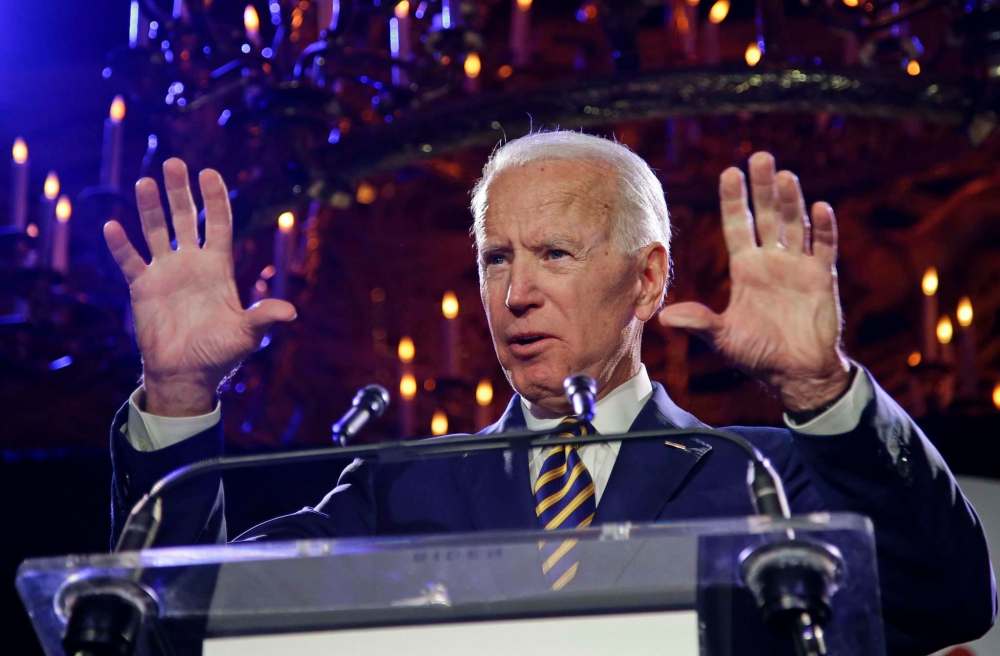Age unavoidable issue in 2020
Advertisement
Read this article for free:
or
Already have an account? Log in here »
To continue reading, please subscribe:
Monthly Digital Subscription
$1 per week for 24 weeks*
- Enjoy unlimited reading on winnipegfreepress.com
- Read the E-Edition, our digital replica newspaper
- Access News Break, our award-winning app
- Play interactive puzzles
*Billed as $4 plus GST every four weeks. Offer only available to new and qualified returning subscribers. Cancel any time.
Read unlimited articles for free today:
or
Already have an account? Log in here »
Hey there, time traveller!
This article was published 06/04/2019 (2159 days ago), so information in it may no longer be current.
Joe Biden’s potential bid for the White House might survive allegations of unwanted touching, but the scrutiny reveals another problem he faces. Every accusation is a reminder the glad-handing, shoulder-squeezing former vice-president is a politician of another era.
Biden, who is also facing renewed criticism for his handling of the Anita Hill hearings when he was a U.S. senator, said in a video this week “social norms are changing” and he “will be more mindful of respecting personal space.”
His “expressions of affection,” as he called them earlier this week, might be unrelated to his age, but anything that calls attention to the fact Biden would be one of the oldest presidential candidates in U.S. history can’t help his chances.

The 76-year-old, who consistently leads Democratic contenders in the polls, is expected to enter the 2020 presidential race later this month. His party’s field already includes two candidates in their 70s: Bernie Sanders and Elizabeth Warren. Sanders, the runner-up for the 2016 nomination, has placed second in recent polls and is 77.
Their age wouldn’t prevent any of the three contenders from doing the work of a president, but it might affect their electability.
If Biden, Sanders or Warren wins the Democratic nomination, they will likely face President Donald Trump in the first U.S. presidential election in which the nominees of both major parties are in their 70s. If Biden runs and wins, he’d be 78 when he takes the oath of office. That’s the same age Trump — the oldest president at the time of his inauguration — would be at the end of his presidency, if he serves two terms.
Biden would also be the oldest president in U.S. history, surpassing Ronald Reagan, who was 77 when he left office. For a party that targets young voters, supporting a centrist who would be five years older than Reagan was when he was sworn in a second time might seem like an odd choice. However, many Democrats would vote for anyone who can beat Trump, and Biden would likely have at least a decent chance.
Trump, 72, has been the focus of speculation about whether he has dementia, but such armchair analyses are sparked by his words and actions, not his age. Regardless, the possibility of two septuagenarians squaring off will prompt many to ask how old is too old to be president.
Biden and Sanders have both said their age would be a legitimate issue, and they might feel compelled to declare they would not seek a second term. That would alleviate some of the inevitable concern about the possibility of a president who’s pushing 90.
It’s anyone’s guess what voters would think of a single-term candidate. In relatively recent years, Biden, John McCain and Bob Dole reportedly toyed with making the pledge. It appears only three future presidents have ever made such a promise during a campaign, and the last was Rutherford B. Hayes in 1876.
There are advantages to serving only a single term. It would allow Biden or Sanders to focus on governing instead of another lengthy and exhausting campaign. A 2020 run would be Biden’s fourth presidential campaign, including his re-election as vice-president, and a fifth would be a gruelling process for even a younger politician.
There are also risks involved with Biden or Sanders declaring themselves one-term candidates. It would draw attention to their age, and it would make their choice of running mates crucial to the party’s chances in both 2020 and 2024. If the Democrats win in 2020, the vice-president might be the next president; if they fail to beat Trump, the VP candidate might not get another chance to be on a presidential ticket.
Their running mates would have to be someone voters could picture as president. Given the age of Biden and Sanders, it’s not unrealistic to think their partners might become president, or acting president, because of death, retirement or illness.
Politics is about winning the next election, not subsequent ones. However, if Biden or Sanders limit themselves to a single term and win the presidency, it might hurt the chances of the Democrats winning the White House in 2024. Incumbent presidents nearly always win re-election, and that kind of advantage is difficult to give up. When a president has served the maximum two terms, voters nearly always vote for the rival party in the next election. With a one-term president, Democrats would risk an accelerated version of that scenario.
At some point, Democrats might have to decide how much they’re willing to gamble to get rid of Trump.
Adam Treusch is assistant city editor at the Winnipeg Free Press.


